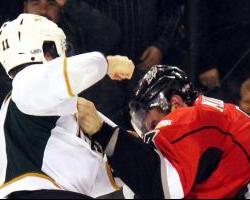[Originally published at Overtime by The Hockey Writers]
Neurologists describe a concussion as a neurometabolic cascade. I hear that term and I fall into a dream of psychedelic waterfalls, of fireflies twinkling at twilight, of a seascape speckled by the starry-eyed blinking of the moonlight.
All that could not be further from reality. Sure, sometimes people 'see stars' when concussed. Other times they black out. And at other times, they see nothing at all. They may not even know they've been concussed. A concussion doesn't even require head contact. It's ridiculous that so many of us can earn the same injury but in such vastly different ways, and with different outcomes.
Changing Times
Not long ago, few in the sports world or even the medical community took concussions very seriously. You got your bell rung, big deal. You only had a concussion if it knocked you out or you weren't sure what day it was.
Now, concussions are one of the hottest topics in sports medicine. In hockey we learn about another concussed player every other day-- news brought to us with plenty of doom and gloom, such as this entry by Adam Proteau of The Hockey News:
The names pile on top of one another like a giant mound of hockey sticks in the world’s biggest pickup game. Evgeni Malkin. Rick Nash. Jeff Skinner. Ryan McDonagh. Vladimir Tarasenko. Only this is a contest you don’t want to play in or watch. This is the concussion game.
Proteau is a pro hockey insider who has more admirably written on the subject before, but other, more reactionary responses have been coming from a variety of other angles, including:
- Parents: One Canadian parent, seemingly caught up in the frenzy, suggested that anyone who permits their child to play contact ice hockey should be charged with child abuse.
- Non-hockey experts: The obligatory statement by the distinguished hockey outsider, in which the initial admiration for the beauty and skill of the sport is violated by the abject horror of fighting and other violent plays.
- Mainstream media: "Inside the Brain Lab" was a pumped up CBC special report from 2011 that so badly milks the issue for urgency that it is at times embarrassing to watch. Referring to one infamous head injury suffered by Sabres legend Rick Martin, correspondent Peter Mansbridge tries to lead Dr. Ann McKee by asking, "Would it surprise you to learn that [disease in Martin's brain] could happen from one concussion?" Yes, she says after a long and uncomfortable pause, that would surprise me, because it is extremely unlikely and there's no evidence to support it.
Modern Mania
It's concussion madness! Concussion mania! and it too shall, not pass, but eventually subside and we will settle into a more comfortable relationship with the mild traumatic brain injury called concussion. It will be an inevitable aspect of sport and of life; we will not fly into a panic each time another player is concussed or use the occasion as a springboard to further points of view. Instead, the concussed player at all levels of hockey will have his or her injury managed and treated appropriately like any other injury, so that they may get back to where they want to be: on the ice.
After all, the only way to end concussions in the sport of hockey is to shut down the sport of hockey. Good luck with that.
With that in mind, let's meander through the minefield of the concussion ...
Click on this link to be taken to Overtime by The Hockey Writers and continue reading about concussions in sports.






